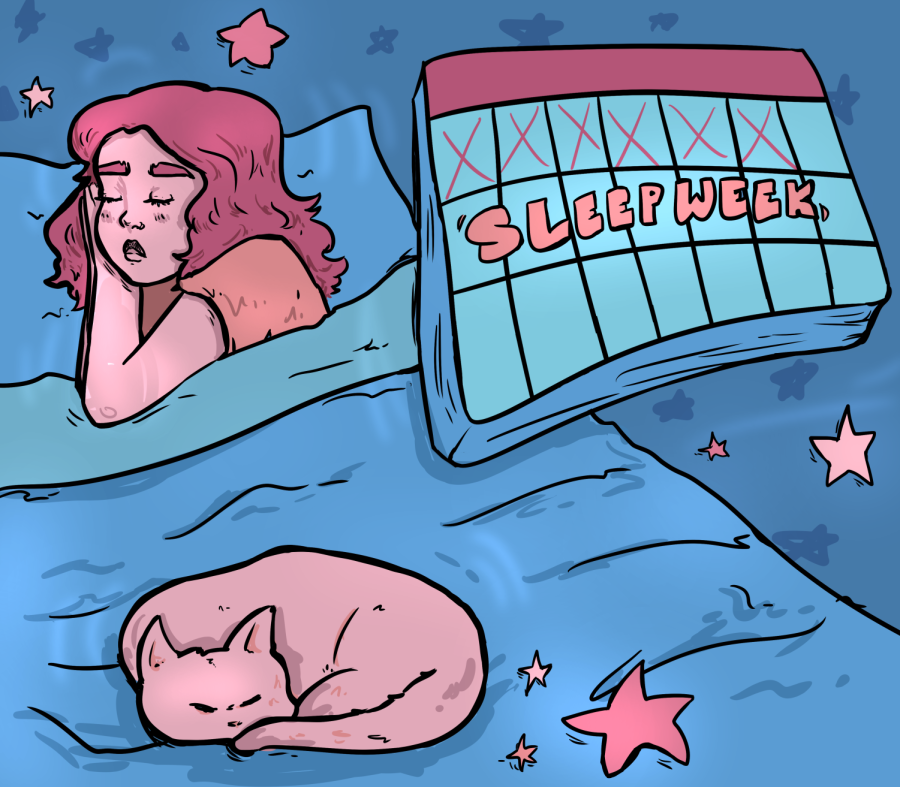‘HealthyHorns Sleep’: Longhorn Wellness Center hosts first Sleep Week
October 10, 2022
More than 600 students participated in 11 on-campus and virtual events designed to help them gain a better night’s sleep at the Longhorn Wellness Center’s first Sleep Week from Oct. 3 to Friday, said Angelique Karditzas, the center’s health promotion coordinator.
The events included creating sleep kits, mindfulness practices and workshops on time management and negotiating roommate conflict for better sleep. Karditzas said recognizing that students struggle with sleep deprivation and restlessness prompted her to host Sleep Week.
“The National College Health Assessment survey data showed that about 75% of students were reporting that (for) three or more days out of the week, they were feeling tired and not well rested enough,” Karditzas said.
Brittany O’Malley, the center’s assistant director for prevention, said the unique aspects of university housing, such as having a roommate, can prevent students from getting enough sleep.
“I think there’s also just a lot of normalization of lack of sleep,” O’Malley said. “Pulling all-nighters is very normalized, unfortunately.”
Sleep impacts muscle repairment, emotional regulation, social connections, memory and cognition — something many people fail to realize, Karditzas said.
The program focused on the various intersections of sleep and other aspects of our lives, Karditzas said. The “Midday Reset” event, an hourlong yoga session, stemmed from the fact that meditation and adequate movement can contribute to a good night’s sleep, Karditzas said.
“I’ve been working on a journey to (better) my holistic well-being and health,” said Fahad Tabrizi, a humanities junior and participant at the “Midday Reset” event. “I’m really glad I came because it was really refreshing.”
“Time and Procrastination,” a session hosted in partnership with the Sanger Learning Center, provided students with resources to track their time allocation and procrastination in order to get enough sleep.
“Your body just needs eight hours of sleep to recuperate and reset,” said Christina Lowe, a finance senior and staff member at the Sanger Learning Center. “The less sleep you get, the less motivated you are to do something.”
Fabian Corona, an anthropology sophomore and attendee of the “Time and Procrastination” event, said his sleeping habits and procrastination are interwoven.
“I have insomnia, so my procrastination comes from knowing that I’m going to be up regardless, so I’ll do it later,” said Corona.
Leonardo Garcia, sociology and race, indigeneity and migration sophomore, said he attended the event to implement better time management methods and sleeping habits.
“I think a really pressing (problem) with sleep is that a lot of college students try to overwork themselves, either willingly or unwillingly, consciously or unconsciously,” Garcia said.
O’Malley said self-awareness is a good place to start in order to improve sleeping habits. A great first step is for students to track their sleep through the sleep diary available on the center’s webpage, Karditzas said.
“A big piece of it is just helping students understand that they have the permission and the ability to have that self-compassion and create those spaces for themselves,” Karditzas said.



